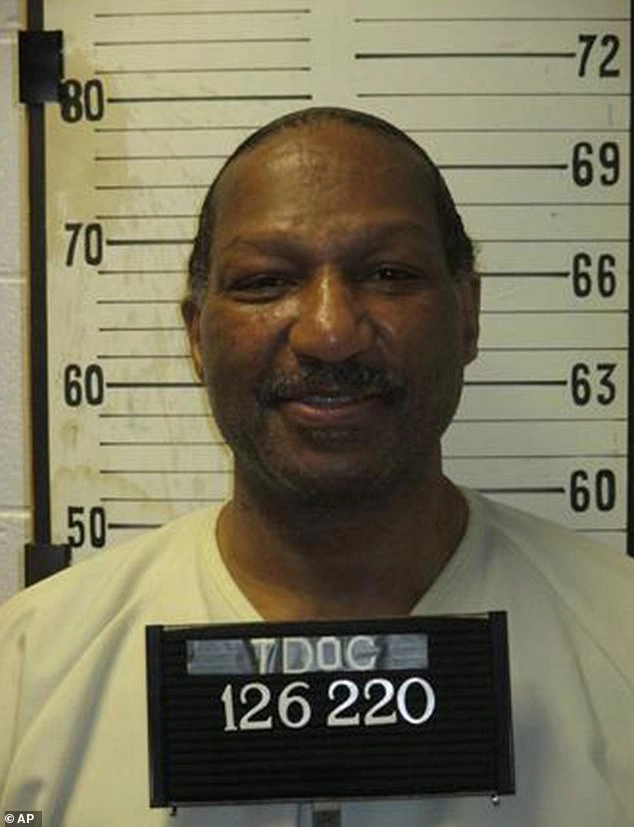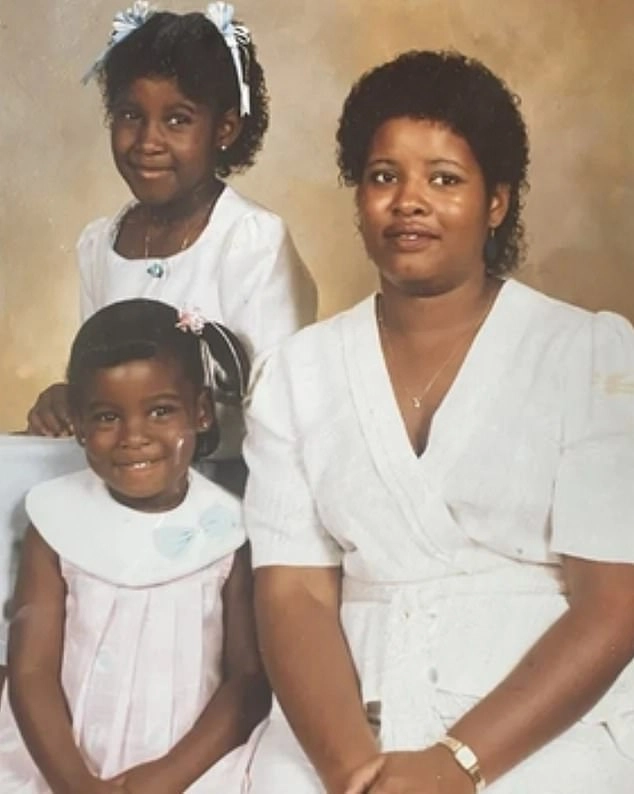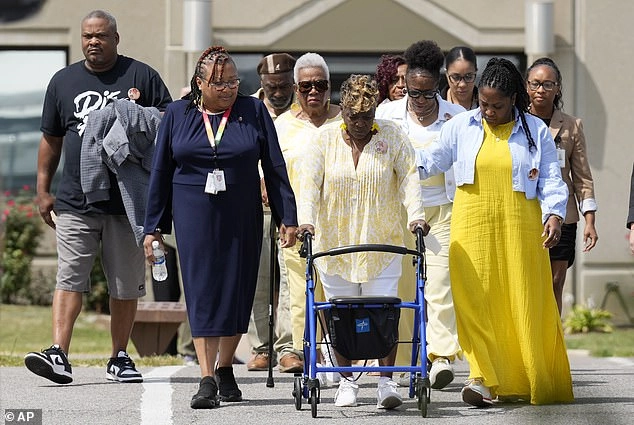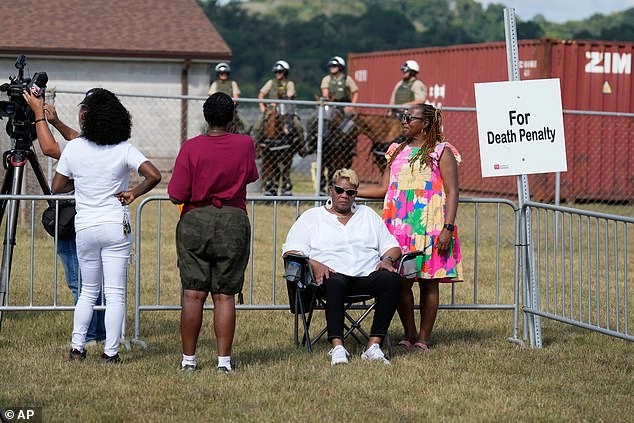Loaded: 0%
Progress: 0%
0:00
LIVE
Need TextA convicted killer who fatally shot his girlfriend and her daughters in their Tennessee home nearly 40 years ago groaned in pain as he was executed today.
Byron Black died at 10.43am Tuesday, roughly 10 minutes after the lethal injection started.
'It's hurting so bad,' Black told a spiritual advisor at 10.33am as his execution began. He reportedly did not deliver a formal last statement.
The murderer, 69, looked around the room and could be heard sighing and breathing heavily, witnesses to his execution allege.
Black was convicted in the 1988 shooting deaths of his girlfriend Angela Clay, 29, and her two daughters, Latoya Clay, 9, and Lakeisha Clay, 6.
Prosecutors said he was in a jealous rage when he shot the three at their home. At the time, Black was on work-release while serving time for shooting Clay's estranged husband.
Black was executed after a back-and-forth in court over whether officials would need to turn off his implantable cardioverter-defibrillator, or ICD.
His attorneys argued the heart-regulating device needed to be deactivated to avoid a 'torturous death', alleging it could shock his heart when the lethal chemicals took effect, causing unnecessary pain and prolonging the execution.
But last week a judge ruled in the state's favor to execute Black without deactivating the device.
 Byron Black died at 10:43am Tuesday, roughly 10 minutes after the lethal injection started
Byron Black died at 10:43am Tuesday, roughly 10 minutes after the lethal injection started  Black was convicted in the 1988 shooting deaths of his girlfriend Angela Clay, 29, and her two daughters, Latoya Clay, 9, and Lakeisha Clay, 6. Prosecutors said he was in a jealous rage when he shot the three at their Tennessee home
Black was convicted in the 1988 shooting deaths of his girlfriend Angela Clay, 29, and her two daughters, Latoya Clay, 9, and Lakeisha Clay, 6. Prosecutors said he was in a jealous rage when he shot the three at their Tennessee home In recent years, Black's legal team unsuccessfully tried to get a new hearing over whether he was intellectually disabled and ineligible for the death penalty under US Supreme Court precedent.
Black was in a wheelchair, suffering from dementia, brain damage, kidney failure, congestive heart failure and other conditions, his attorneys have said.
His attorneys said that if they had delayed a prior attempt to seek his intellectual disability claim, he would have been spared under a 2021 state law.
Nashville District Attorney Glenn Funk contended in 2022 that Black is intellectually disabled and deserved a hearing under that 2021 law, but the judge denied it.
That is because the 2021 law denies a hearing to people on death row who have already filed a similar request and a court has ruled on it 'on the merits.'
In Funk's attempt, he focused on input from an expert for the state in 2004 who determined back then that Black didn't meet the criteria for what was then called 'mental retardation'.
 Relatives of Angela Clay and daughters Lakeisha and Latoya are escorted from the Administration Building at Riverbend Maximum Security Institution after the execution of Byron Black on Tuesday, August 5, 2025
Relatives of Angela Clay and daughters Lakeisha and Latoya are escorted from the Administration Building at Riverbend Maximum Security Institution after the execution of Byron Black on Tuesday, August 5, 2025  Relatives of Black's victims wait in an area reserved for pro-death penalty advocates outside Riverbend Maximum Security Institution before Black's execution
Relatives of Black's victims wait in an area reserved for pro-death penalty advocates outside Riverbend Maximum Security Institution before Black's execution  Necoule Davis, left, and Sharonda Page, both cousins of Black's victims, wait outside Riverbend Maximum Security Institution before the killer's execution
Necoule Davis, left, and Sharonda Page, both cousins of Black's victims, wait outside Riverbend Maximum Security Institution before the killer's execution But she concluded that Black met the new law's criteria for a diagnosis of intellectual disability.
Black also sought a determination by the courts that he was incompetent to be executed.
In mid-July, a trial court judge agreed with Black's attorneys that officials must have the device deactivated to avert the risk that it could cause unnecessary pain and prolong the execution.
But the state Supreme Court intervened Thursday to overturn that decision, saying the other judge lacked authority to order the change.
The US Supreme Court also rejected Black's final appeal Monday and Tennessee Gov. Bill Lee declined to stop the execution.
The nonprofit Death Penalty Information Center said it's unaware of any other cases in which an inmate was making similar claims to Black's about ICDs or pacemakers.
Black's attorneys said they haven't found a comparable case, either.
 Byron Lewis Black (right) hears testimony in his trial on murder charges in Metro's Circuit Court at the Davidson County Courthouse on March 9, 1989
Byron Lewis Black (right) hears testimony in his trial on murder charges in Metro's Circuit Court at the Davidson County Courthouse on March 9, 1989  Anti-death penalty demonstrators gather outside Riverbend Maximum Security Institution before Byron Black's execution on Tuesday
Anti-death penalty demonstrators gather outside Riverbend Maximum Security Institution before Byron Black's execution on Tuesday Black's death was Tennessee's second execution since May, after a pause for five years, first because of COVID-19 and then because of missteps by state corrections officials.
Twenty-eight men have died by court-ordered execution so far this year in the US, and eight other people are scheduled to be put to death in seven states during the remainder of 2025.
The number of executions this year exceeds the 25 carried out last year and in 2018. It is the highest total since 2015, when 28 people were put to death.
Breaking News Tennessee US Supreme Court


